陕西省宁强县天津高级中学高中英语《Module1 British and American Engl
高中英语Module1BritishandAmericanEnglish单元小结教学案外研版

Module 1 British and American EnglishThe linguists, who study linguistics,say American English has a lot in common withBritish English. That is, the former issimilar to the latter. But in fact they differin many ways. First, they have differencesin vocabulary. For example, people getaround in London by underground, while in New York by subway. Besides, the same word has a slightly different meaning, which can be confusing. Second, the differences between them exist in grammar and prepositions. Americans use intheteam, while the British use ontheteam. Third, there are also differences between the two varieties in spelling and pronunciation. Compared with British English’s spelling, American English’s spelling seems simpler. The work of Noah made a difference, leading to this variation.Noah simplified some words’spelling and made them have a distinctive American look. He wrote a dictionary, introducing lots of new American words, pronunciation, use and new spelling. Although British criticised it and weren’t in favour of these changes, it rapidly became popular among Americans thanks to Noah’s attempt. The dictionary became a standard reference book in the USA.语言学家,即研究语言学的人说美式英语和英式英语有很多共同特点。
高中英语 Module 1 British and American English课时教案 外研版
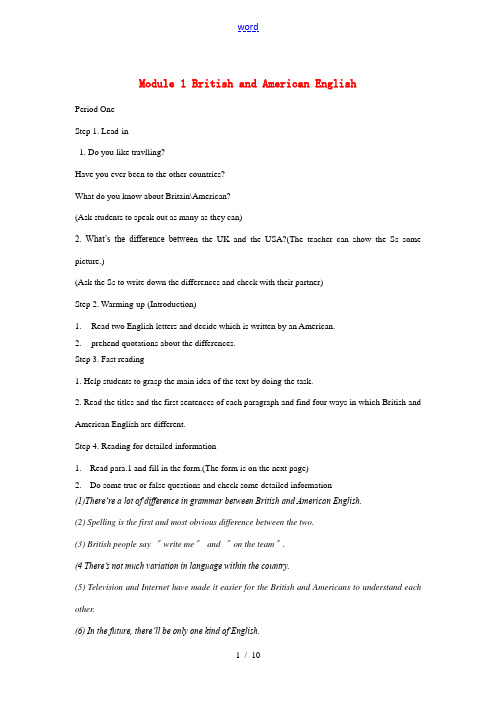
Module 1 British and American EnglishPeriod OneStep 1. Lead-in1. Do you like travlling?Have you ever been to the other countries?What do you know about Britain\American?(Ask students to speak out as many as they can)2. What’s the difference betwee n the UK and the USA?(The teacher can show the Ss some picture.)(Ask the Ss to write down the differences and check with their partner)Step 2. Warming-up (Introduction)1.Read two English letters and decide which is written by an American.2.prehend quotations about the differences.Step 3. Fast reading1. Help students to grasp the main idea of the text by doing the task.2. Read the titles and the first sentences of each paragraph and find four ways in which British and American English are different.Step 4. Reading for detailed information1.Read para.1 and fill in the form.(The form is on the next page)2.Do some true or false questions and check some detailed information(1)There’re a lot of difference in grammar between British and American English.(2) Spelling is the first and most obvious difference between the two.(3) British people say 〞write me〞and 〞on the team〞.(4 There’s not much variation in language within the country.(5) Television and Internet have made it easier for the British and Americans to understand each other.(6) In the future, there’ll be only one kind of English.3. Beautiful sentences: to learn some important structuresStep 5. Practise1.fill in the blanks with some key wordsThere’re four ways in which British and American English ________ from each other. The first and most ________ way is in the vocabulary. In grammar there’re a few __________. The British say Have you got…? ______Americans prefer Do you have…? The British use prepositions ______ Americans sometimes ______them. The other two areas in which the two _________ are different are spelling and pronunciation. But for more than a century munications have developed _______.Thanks to satellite TV and the Internet, it has been possible to listen to many Englishmen at the ______ of a switch. So experts believe that the two are moving ______.3. Retell the text according to it.4. DiscussionWhich of the following do you think is the best language in the future? Why?British English, American English, world English, ChineseStep 6. V ocabularyTask: Rewrite the sentences using the British words.1. Match the British and American words and phases in the box..2. Ask the students to read their answers out and pare with their partners.3. Rewrite the sentences using British words. .4. Summarize: and Practice:Step 7. Open workTry to find information about Chinese and prepare a report to introduce the following three aspects of Chinese.1.The writing system2.Varieties of Chinese3. Language todayPeriod TwoStep 1. Grammar 1Task 1: Find out the uses of the verbs. Rules of the tenses.Activity 1. Match the sentences with the correct meanings.Activity2. plete the sentences with the correct form of the verbs.Activity3. Tell the uses of the verbs. Rules of the tenses(1)plete the sentences in your own words.(2)Observe, pare and find out the rules.[NMET.2001]:I ____ ping-pang quite well, but I haven’t had time to play since the new year .A. will playB. have playedC. playedD. play[春招2000]:—You’re drinking too much.—Only at home. No one ________ me but you.A.is seeingB. had seenC. seesD. sa w2. Can you explain the following use of tenses.•present simple tense•present continuous tense•present perfect tense•future tenseStep 2. FunctionTask: Giving reasonsDirections:1. Underline the words which introduce reasons.2. Answer the questions.3. plete the sentences with because\since\as or now that.Step 3. Testplete the messages with the correct form of the verbs.Hi Mum,Hope you__________(be) well. I ________(have) a lovely time in New York. Tomorrowwe___________ (go) to see the fireworks. It’s hard to understand the accent here, but it ________(get) easier ,as I _________(be) here for 3 weeks. Next week we _________(fly) to Mexico where they ________(speak) no English at all, just Spanish. I __________(Spend) nearly all the money you gave me!Love , Xiao PingPractice : Make your own sentences creatively, using because, since, as or now that.Step 4. Everyday EnglishTask: Use the phrases freely.1. Remind the students of the expressions that we have learned.2. Ask the students to remember them .3. Speaking practice:Have a conversation using some of the phrases.Step 5. Homework•Have a good revision of today’s lesson and make sentences with the tenses and variou s words to express reasons. It’s better to do some related exercises.Period ThreeStep1. Warming up: Talk about the problems exchange students have.•understanding the language•getting on with people•food•different school subjects and timetable•local customs•climateStep 2. PresentationListen to the target language:•V ocabulary and Listening –2.Listening to the 1st part(5m)Listen and plete the passage. •Hello, and wele to today’s edition of In the air. As you know, every week on this programme we discuss an aspect of the way we _ _1____ now, and today’s topic is the language we____2____-English. So that’s something which affects us all. The question is,what’s going to _ _3 ___ to the way we speak English in the future? Are we all going to speak like Americans? Or will British English continue to _ 4___? Later on we’re going to _ 5___ you to phone in and _ _6___ your views on the subject, but first we’re going to _ _7___ to two young people, one American, and one British, who have spent time on an ed ucational exchange in the other’s country. We _ _8___ they will have some interesting ideas on the subject.•Play again to answer the quesrions. Make notes if necessary .( Activity 4)•Have the students pare the answer in pairs.•Play the tape a third time for a final check.•Check notes with the teacher.Step 3. Speaking and Writing•1. Review the content of the text by asking some questions.•In how many ways are American English and British English different?•Which is the first and most obvious way?•......2. The great debateWork in groups. Read the notes and decide which is the best variety of language in the future. Give your reasons.British English, American English, World English & Chinese3. WritingWrite a passage about your favourite choice and the reasons in the discussion above or write three more paragraghs about the Chinese language(activity 4 on P8).Step 4. HomeworkGet more information about the language through the Internet or other method to support your position.Period FourStep 1. Cultural corner1. Read the text quickly and match each paragragh with the correct main idea.2. Appreciate and analyze 2 or 3 long sentences.Step 2. Module File1. Review: Go over the vocabulary and grammar focus in the module file.2. Put“?〞next to the things you are not sure of .Then solve the problems in groups or raise your questions.3. Do some exercises to consolidate what we learned in this module.Step 3. HomeworkRecite the phrases and sentence patterns .Part One: Teaching DesignPeriod 3: Grammar—Review of verb forms (1)Goals●To review Present simple, present continuous, present perfect and future reference; for and since with present perfectProcedures▇Reviewing Present simple, present continuous, present perfectActive TensesTHE PASSIVE TENSES■Using the Present Perfect Tense: FOR or SINCE?We use Present Perfect tense to talk about action which started in the past and continues up to the present.ExamplesI have had this puter for about a year.How long have you been at this school?I haven't seen Julia since September.Tip! For other uses of the Present Perfect tense, see the Present Perfect Tense - When To Use.We use for with a period of time, for example: a few days, half an hour, two years. We use since with the time when the action started, for example: last year, June 8, I met you.Each of these present perfect sentences contains a time expression. Each time expression is alength of time (which requires FOR) or a starting time (which requires SINCE).1 Maya has been a professional ________ 1989.2 So far, it has rained ________ five hours.3 I haven't been snowboarding ________ last winter.4 Jo has been a student here ________ March.5 The beaver has been an emblem of Canada ________ many years.6 Cougars have almost disappeared from the Victoria area ________ humans settled here.7 Mary has kept a diary ________ she was ten years old.8 First Nations people in British Columbia have told stories about the eagle ________ hundreds of years.9 The Canadian two-dollar coin (or toonie) has been in circulation ________ 1996.10 They've been married ________ twenty-five years.11 I haven't phoned home______ Christmas.12 We've been here__________ nine o'clock.13 I have worked for International House__________ more than eight years.14 I haven't visited my home town_________ I left school.15 I haven't been to the cinema__________ ages.16 I have studied non-stop_________ 9.15.17 I have had a driving licence_________I was eighteen.18 She hasn't had a day off _________1999.19 Johan has been in England__________more than two weeks now.20 Peter has been my best friend_________ we were nine.■Closing down by deciding if you need for or since with these time expressions.---for/since last weekend---for/since ten seconds---for/since Christmas Eve---for/since a decade---for/since a couple of days---for/since my birthday---for/since a long time---for/since ten centuries---for/since the 70s---for/since I was a boy---for/since August---for/since the last month---for/since fifteen years---for/since ten seconds---for/since Christmas Eve---for/since a decade---for/since I finished school---for/since a couple of days---for/since my birthday---for/since a long time---for/since ten centuries---for/since the 70s---for/since I was a boy---for/since August---for/since the last month---for/since fifteen years---for/since the accident---for/since then---for/since we bought this house ---for/since last month---for/since I met you。
【全国百强校】天津市第一中学外研版高中英语必修五教案:Module 1British and American English(PDF版)
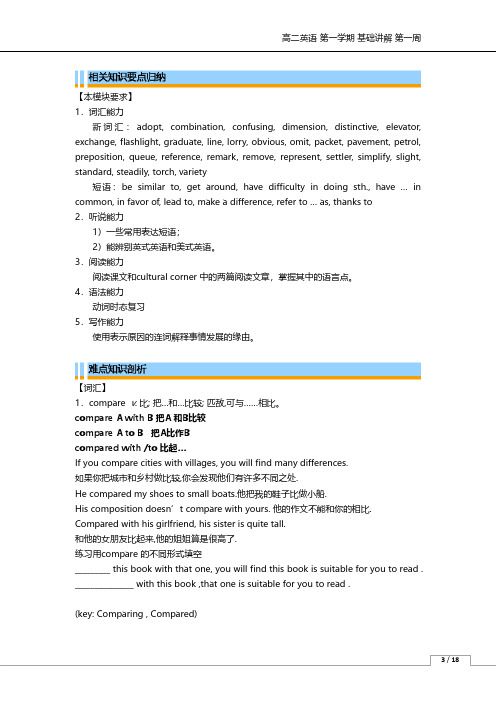
【本模块要求】1.词汇能力新词汇:adopt, combination, confusing, dimension, distinctive, elevator, exchange, flashlight, graduate, line, lorry, obvious, omit, packet, pavement, petrol, preposition, queue, reference, remark, remove, represent, settler, simplify, slight, standard, steadily, torch, variety短语:be similar to, get around, have difficulty in doing sth., have … in common, in favor of, lead to, make a difference, refer to … as, thanks to2.听说能力1)一些常用表达短语;2)能辨别英式英语和美式英语。
3.阅读能力阅读课文和cultural corner 中的两篇阅读文章,掌握其中的语言点。
4.语法能力动词时态复习5.写作能力使用表示原因的连词解释事情发展的缘由。
【词汇】1.compare v. 比; 把…和…比较; 匹敌,可与……相比。
compare A with B 把A 和B比较compare A to B 把A比作Bcompared with /to 比起…If you compare cities with villages, you will find many differences.如果你把城市和乡村做比较,你会发现他们有许多不同之处.He compared my shoes to small boats.他把我的鞋子比做小船.His composition doesn’t compare with yours. 他的作文不能和你的相比. Compared with his girlfriend, his sister is quite tall.和他的女朋友比起来,他的姐姐算是很高了.练习用compare 的不同形式填空_________ this book with that one, you will find this book is suitable for you to read . _______________ with this book ,that one is suitable for you to read .(key: Comparing , Compared)2.exchange vt./ n.交换, 调换, 兑换, 交流, 交易He gave me an apple in exchange for a cake. 他给我一个苹果,换一块蛋糕。
高中英语Module1BritishandAmericanEnglishSectionⅠIntrod

高中英语Module1BritishandAmericanEnglishSectionⅠIntrodu ction&ReadingPrereading教案含解析外研版必修5083011Module 1 British and American English Although people still talk about different types of English —American English, Australian English, and Indian English —it is interesting to notice how close they are to each other nowadays. Any native speaker reading or listening to another “type” of English will understand almost every word.However, largely because of global communication, cinema, television and especially the Internet, different types of English have influenced each other a lot recently. This is coming in one side — from the US to Britain — and it has changed our daily language so much. Teens and young adults in Britain use American vocabulary that has crossed the Atlantic all the time —things that young speakers like a lot are described as cool or awesome, and, as a way to refuse to do something impossible, we often hear the phrase No way!I was fortunate enough to work on a vocabulary research project, which is called the English Vocabulary Profile. What did we find out? There are some words that are still British or American. British people have biscuits with their cup of tea or coffee, but Americans have cookies. We also have cookies in Britain, but they are a certain type of biscuits, such as chocolate chip cookies, where the original recipe is American. Americans who are wearing pants definitely have their legs covered, but if a British person is dressed only in pants, they are in their underwear!Phrasa l verbs (verbs with two or more words like “take off” or “live up to”) are another area of difference, and there are slightly fewer of them in American English. When British and American speakers, for example, talk of a relationship breaking up, Americans will not use this phrasal verb to mean “finishing a school term” as we do in Britain.Overall, the 10 most common words (the, of, to, and, a, in, that, is, for and I) are the same in both countries, and the vast majority of the 5,000 most common words in the UK are also in the USA's top 5,000.Section_ⅠIntroduction_&_Reading_—_Prereading[原文呈现]Words, words, wordsBritish and American English are different in① many ways. The first and most obvious② way is in the vocabulary.There are hundreds of different words which are not used on the other side of the Atlantic, or which are used with a different meaning ③. Some of these words are well known —Americans drive automobiles down④freeways and fill up with⑤gas; the British drive cars along motorways⑥ and fill up with petrol⑦. As a tourist, you will need to use the underground⑧in London or the subway⑨in New York, or maybe you will prefer to⑩get around⑪ the town by taxi (British) or cab (American).[读文清障]①be different in在……方面不同be different from与……不一样②obvious/'ɒbviəs/adj.显然的,显而易见的③which引导两个定语从句,均修饰words。
高中英语:module1 British and American English教案(外研版)

Module 1 British and American English Period OneStep 1. Lead-in1. Do you like travelling?Have you ever been to the other countries?What do you know about Britain\American?(Ask students to speak out as many as they can)2. What’s the difference betwe en the UK and the USA?(The teacher can show the Ss some picture.)(Ask the Ss to write down the differences and check with their partner)Step 2. Warming-up (Introduction)Read two English letters and decide which is written by an American.Comprehend quotations about the differences.Step 3. Fast reading1. Help students to grasp the main idea of the text by doing the task.2. Read the titles and the first sentences of each paragraph and find four ways in which British and American English are different.Step 4. Reading for detailed informationRead para.1 and fill in the form.(The form is on the next page)Do some true or false questions and check some detailed information(1)There’re a lot of difference in grammar between British and American English.(2) Spelling is the first and most obvious difference between the two.(3) British people say ”write me” and ”on the team”.(4 There’s not much variation in language within the country.(5) Television and Internet have made it easier for the British and Americans to understand each other.(6) In the future, there’ll be only one kind of English.3. Beautiful sentences: to learn some important structuresStep 5. Practisefill in the blanks with some key wordsThere’re four ways in which British and American En glish ________ from each other. The first and most ________ way is in the vocabulary. In grammar there’re a few __________. The British say Have you got…? ______Americans prefer Do you have…? The British use prepositions ______ Americans sometimes ______them. The other two areas in which the two _________ are different are spelling and pronunciation. But for more than a century communications have developed _______.Thanks to satellite TV and the Internet, it has been possible to listen to many Englishmen at the ______ of a switch. So experts believe that the two are moving ______.3. Retell the text according to it.4. DiscussionWhich of the following do you think is the best language in the future? Why?British English, American English, world English, ChineseStep 6. VocabularyTask: Rewrite the sentences using the British words.1. Match the British and American words and phases in the box..2. Ask the students to read their answers out and compare with their partners.3. Rewrite the sentences using British words. .4. Summarize: and Practice:Step 7. Open workTry to find information about Chinese and prepare a report to introduce the following three aspects of Chinese.The writing systemVarieties of Chinese3. Language todayPeriod TwoStep 1. Grammar 1Task 1: Find out the uses of the verbs. Rules of the tenses.Activity 1. Match the sentences with the correct meanings.Activity2. complete the sentences with the correct form of the verbs.Activity3. Tell the uses of the verbs. Rules of the tenses(1)Complete the sentences in your own words.(2)Observe, compare and find out the rules.【NMET.2001】:I ____ ping-pang quite well, but I haven’t had time to play since the new year .A. will playB. have playedC. playedD. play【北京春招2000】:—You’re drinking too much.—Only at home. No one ________ me but you.is seeing B. had seen C. sees D. saw2. Can you explain the following use of tenses.present simple tensepresent continuous tensepresent perfect tensefuture tenseStep 2. FunctionTask: Giving reasonsDirections:1. Underline the words which introduce reasons.2. Answer the questions.3. Complete the sentences with because\since\as or now that.Step 3. TestComplete the messages with the correct form of the verbs.Hi Mum,Hope you__________(be) well. I ________(have) a lovely time in New York. Tomorrow we___________ (go) to see the fireworks. It’s hard to understand the accent here, but it ________(get) easier ,as I _________(be) here for 3 weeks. Next week we _________(fly) to Mexico where they ________(speak) no English at all, just Spanish. I __________(Spend) nearly all the money you gave me!Love , Xiao PingPractice : Make your own sentences creatively, using because, since, as or now that.Step 4. Everyday EnglishTask: Use the phrases freely.1. Remind the students of the expressions that we have learned.2. Ask the students to remember them .3. Speaking practice:Have a conversation using some of the phrases.Step 5. HomeworkHave a good revision of today’s lesson and make sentenc es with the tenses and various words to express reasons. It’s better to do some related exercises.Period ThreeStep1. Warming up: Talk about the problems exchange students have.understanding the languagegetting on with peoplefooddifferent school subjects and timetablelocal customsclimateStep 2. PresentationListen to the target language:Vocabulary and Listening –2.Listening to the 1st part(5m) Listen and complete the passage.Hello, and welcome to today’s edition of In the air. As you know, every week on this programme we discuss an aspect of the way we _ _1____ now, and today’s topic is the language we ____2____-English. So that’s something which affects us all. The question is,what’s going to _ _3 ___ to the way we speak English in the future? Are we all going to speak like Americans? Or will British English continue to _ 4___? Later on we’re going to _ 5___ you to phone in and _ _6___ your views on the subject, but first we’re going to _ _7___ to two young people, one American, and one British, who have spent time on an educational exchange in the other’s country. We _ _8___ they will have some interesting ideas on the subject.Play again to answer the quesrions. Make notes if necessary .( Activity 4)Have the students compare the answer in pairs.Play the tape a third time for a final check.Check notes with the teacher.Step 3. Speaking and Writing1. Review the content of the text by asking some questions.In how many ways are American English and British English different?Which is the first and most obvious way?......2. The great debateWork in groups. Read the notes and decide which is the best variety of language in the future. Give your reasons.British English, American English, World English & Chinese3. WritingWrite a passage about your favourite choice and the reasons in the discussion above or write three more paragraghs about the Chinese language(activity 4 on P8).Step 4. HomeworkGet more information about the language through the Internet or other method to support your composition.Period FourStep 1. Cultural corner1. Read the text quickly and match each paragragh with the correct main idea.2. Appreciate and analyze 2 or 3 long sentences.Step 2. Module File1. Review: Go over the vocabulary and grammar focus in the module file.2. Put“?” next to the things you are not sure of .Then solve the problems in groups or raise your questions.3. Do some exercises to consolidate what we learned in this module.Step 3. HomeworkRecite the phrases and sentence patterns .Period 3: Grammar—Review of verb forms (1)Goals●To review Present simple, present continuous, present perfect and future reference; for and since with present perfectProcedures▇Reviewing Present simple, present continuous, present perfectUsing the Present Perfect Tense: FOR or SINCE?We use Present Perfect tense to talk about action which started in the past and continues up to the present.ExamplesI have had this computer for about a year.How long have you been at this school?I haven't seen Julia since September.Tip! For other uses of the Present Perfect tense, see the Present Perfect Tense - When To Use. We use for with a period of time, for example: a few days, half an hour, two years. We use since with the time when the action started, for example: last year, June 8, I met you.Each of these present perfect sentences contains a time expression. Each time expression is a length of time (which requires FOR) or a starting time (which requires SINCE).1 Maya has been a professional ________ 1989.2 So far, it has rained ________ five hours.3 I haven't been snowboarding ________ last winter.4 Jo has been a student here ________ March.5 The beaver has been an emblem of Canada ________ many years.6 Cougars have almost disappeared from the Victoria area ________ humans settled here.7 Mary has kept a diary ________ she was ten years old.8 First Nations people in British Columbia have told stories about the eagle ________ hundreds of years.9 The Canadian two-dollar coin (or toonie) has been in circulation ________ 1996.10 They've been married ________ twenty-five years.11 I haven't phoned home______ Christmas.12 We've been here__________ nine o'clock.13 I have worked for International House__________ more than eight years.14 I haven't visited my home town_________ I left school.15 I haven't been to the cinema__________ ages.16 I have studied non-stop_________ 9.15.17 I have had a driving licence_________I was eighteen.18 She hasn't had a day off _________1999.19 Johan has been in England__________more than two weeks now.20 Peter has been my best friend_________ we were nine.■Closing down by deciding if you need for or since with these time expressions.---for/since last weekend---for/since ten seconds---for/since Christmas Eve---for/since a decade---for/since I finished school---for/since a couple of days---for/since my birthday---for/since a long time---for/since ten centuries---for/since the 70s---for/since I was a boy---for/since August---for/since the last month---for/since fifteen years---for/since ten seconds---for/since Christmas Eve---for/since a decade---for/since I finished school---for/since a couple of days---for/since my birthday---for/since a long time---for/since ten centuries---for/since the 70s---for/since I was a boy---for/since August---for/since the last month---for/since fifteen years---for/since the accident---for/since then---for/since we bought this house ---for/since last month---for/since a millennium---for/since I met you。
高中英语 Module1 British and American English课件 外研版必修5
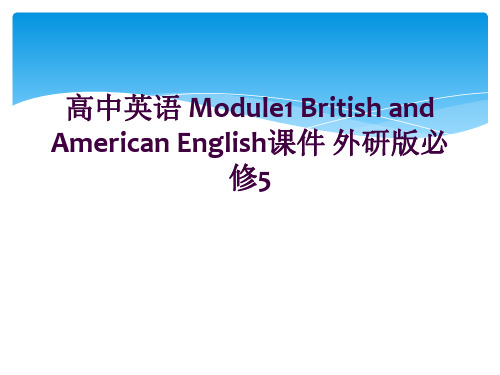
4. What will happen to Chinese in the future?
Homework – Task of the lesson
Reading and Speaking- 5. Discussion (5m) Discuss the
following questions.
1. How many main varieties of Chinese are there?
2. In what ways are they different?
optimistic?
American
3. Which is the most pessimistic?
English 2. D 3. B
4. Which (if any) do you
4. (open)
think are funny?
5. D
5 Which is good news for
6. Henry Sweet
which British and American English are different.
1. Vocabulary 2. Grammar 3. Spelling 4. pronunciation
Scanning (10m) Read again
paragraph by paragraph and
B6. A. a Chinese accent B. some British accents
7. C. a CNN newsreader
高中英语Module1BritishandAmericanEnglishSectionⅢInteg

⑯现在分词短语在此处作结果状语。 ⑰ever 与最高级连用,意为“空前,有史以来”;与比较级 连用,意为“曾经,以往任何时候”,用来加强语气。 ⑱adopt vt.采用,采纳;领养 注意形似词 adapt,意为“使……适应,改编”。 ⑲silent letters 不发音的字母 ⑳be best known for 因……而最著名 原级:be well known for
13._____l_o_o_k ______n.外观;外表;样子 14.____r_e_f_e_r ______v.参考;查阅;谈及;提到 →___r_e_fe_r_e_n_c_e ____n.参考;查阅
Ⅱ.核心短语 1.___g_e_t_u_s_e_d_t_o_______习惯于 2._____s_o__fa_r_______迄今为止 3.______p_ic_k__u_p_________(偶然)学会;捡起;开车接 4._____b_e_l_o_n_g_t_o_______属于 5.___i_n_f_a_v_o_u_r _o_f________同意;支持 6. ___r_e_fe_r_t_o_.._.a_s_.._._____称……为……
By the 1850s it was selling one million copies a year, _____m_a_k_in_g______it one of the most popular school books ever.
课文预读
The Man Who Made Spelling Simple In English the spelling of words does not always① represent② the sound. So people say /raɪt/ but spell it right, or write, or even rite. Combinations③ of letters (like ough) may be pronounced in a number of ways④. And some words just seem to have too many letters.
Module 1 British and American English(一)-天津市第一中学外研版高中英语必修五习题课件
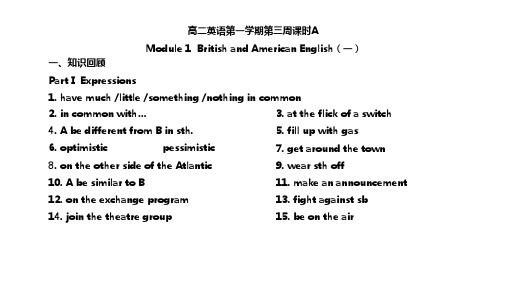
Part II Sentences & structures
7. 1) But it has also led to lots of American words and structures passing into British
English.
2) You find newsreaders and weather forecasters all speaking with different accents.
as between them.
6.A Londoner has more difficulty understanding a Scotsman from Glasgow than
understanding a New Yorker.
Do Chinese people from different regions have problems understanding each other?
“Englishes”, not just two main varieties.
10.This non-stop communication, the experts think, has made it easier for British people
and Americans to understand each other.
23. refer to sth. as…
24. thanks to
25. adopt suggestions / a child
26. a standard reference book
27. exchange this book for a better one
28. switch to local time
陕西省宁强县天津高级中学高中英语《Module1 British and American En
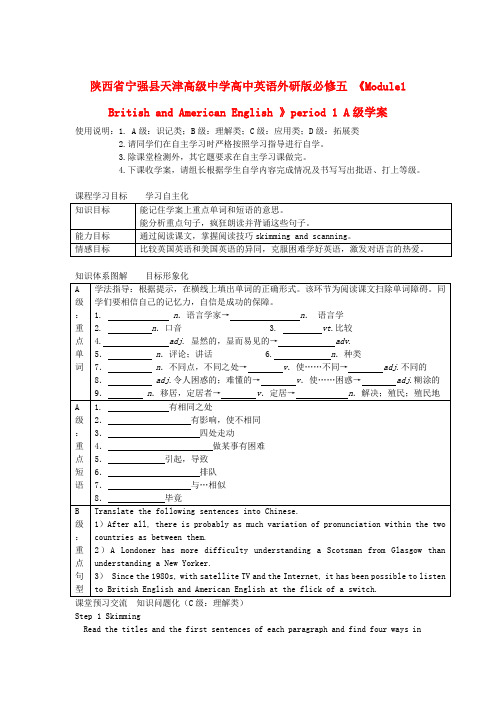
陕西省宁强县天津高级中学高中英语外研版必修五《Module1 British and American English 》period 1 A级学案使用说明:1. A级:识记类;B级:理解类;C级:应用类;D级:拓展类2.请同学们在自主学习时严格按照学习指导进行自学。
3.除课堂检测外,其它题要求在自主学习课做完。
4.下课收学案,请组长根据学生自学内容完成情况及书写写出批语、打上等级。
课程学习目标学习自主化课堂预习交流知识问题化(C级:理解类)Step 1 SkimmingRead the titles and the first sentences of each paragraph and find four ways inwhich British and American English are different.1) 2) 3) 4)Step 2 ScanningRead the first four paragraphs again and make notes of the differencesStep3 Choose the best answers.1) Why is it much easier for us to listen to British and American English nowadays?A. Thanks to the TV and InternetB. Because they are both popularC. Both A and BD. Not mentioned in the text.2) Why do many people believe that British English will disappear in the future?A. Because it is not easy to understand.B. Because its spelling is more difficultC. Because lots of American words and structures have passed into it.D. Because it is not as useful as American English.3) What will happen to English in the future?短文改错(共有十处错误,每处错误只涉及到一个词的删除,添加或修改)Music alwa ys has a special effect for people. You don’t have to know where it comes orwhat language it is,but still you can enjoy it. Of all the music, I like country music better. I like the comfortable feelings it gives me. It was on the radio that I first heard of it. Though I can’t remember the name of the song,but I remember that I was thinking the blue sky,the green land and the quiet life in the countryside then I was listening to it. From then on, I took great interests in country music and bought a lot of tapes. In my spare time,I like to play the tape and enjoying the music myself. My parents like it,too. They say the music always remind them of the good old days.。
高中英语 module1 British and American English教案 外研版必修5
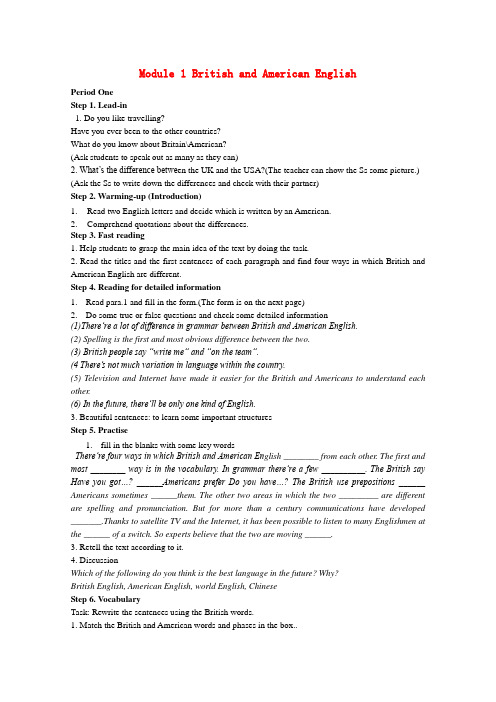
Module 1 British and American EnglishPeriod OneStep 1. Lead-in1. Do you like travelling?Have you ever been to the other countries?What do you know about Britain\American?(Ask students to speak out as many as they can)2. What’s the difference betwe en the UK and the USA?(The teacher can show the Ss some picture.) (Ask the Ss to write down the differences and check with their partner)Step 2. Warming-up (Introduction)1.Read two English letters and decide which is written by an American.prehend quotations about the differences.Step 3. Fast reading1. Help students to grasp the main idea of the text by doing the task.2. Read the titles and the first sentences of each paragraph and find four ways in which British and American English are different.Step 4. Reading for detailed information1.Read para.1 and fill in the form.(The form is on the next page)2.Do some true or false questions and check some detailed information(1)There’re a lot of difference in grammar between British and American English.(2) Spelling is the first and most obvious difference between the two.(3) British people say ”write me” and ”on the team”.(4 There’s not much variation in language within the country.(5) Television and Internet have made it easier for the British and Americans to understand each other.(6) In the future, there’ll be only one kind of English.3. Beautiful sentences: to learn some important structuresStep 5. Practise1.fill in the blanks with some key wordsThere’re four ways in which British and American En glish ________ from each other. The first and most ________ way is in the vocabulary. In grammar there’re a few __________. The British say Have you got…? ______Americans prefer Do you have…? The British use prepositions ______ Americans sometimes ______them. The other two areas in which the two _________ are different are spelling and pronunciation. But for more than a century communications have developed _______.Thanks to satellite TV and the Internet, it has been possible to listen to many Englishmen at the ______ of a switch. So experts believe that the two are moving ______.3. Retell the text according to it.4. DiscussionWhich of the following do you think is the best language in the future? Why?British English, American English, world English, ChineseStep 6. VocabularyTask: Rewrite the sentences using the British words.1. Match the British and American words and phases in the box..2. Ask the students to read their answers out and compare with their partners.3. Rewrite the sentences using British words. .4. Summarize: and Practice:Step 7. Open workTry to find information about Chinese and prepare a report to introduce the following three aspects of Chinese.1.The writing system2.Varieties of Chinese3. Language todayPeriod TwoStep 1. Grammar 1Task 1: Find out the uses of the verbs. Rules of the tenses.Activity 1. Match the sentences with the correct meanings.Activity2. complete the sentences with the correct form of the verbs.Activity3. Tell the uses of the verbs. Rules of the tenses(1)Complete the sentences in your own words.(2)Observe, compare and find out the rules.【NMET.2001】:I ____ ping-pang quite well, but I haven’t had time to play since the new year .A. will playB. have playedC. playedD. play【北京春招2000】:—Yo u’re drinking too much.—Only at home. No one ________ me but you.A.is seeingB. had seenC. seesD. sa w2. Can you explain the following use of tenses.•present simple tense•present continuous tense•present perfect tense•future tenseStep 2. FunctionTask: Giving reasonsDirections:1. Underline the words which introduce reasons.2. Answer the questions.3. Complete the sentences with because\since\as or now that.Step 3. TestComplete the messages with the correct form of the verbs.Hi Mum,Hope you__________(be) well. I ________(have) a lovely time in New York. Tomorrow we___________ (go) to see the fireworks. It’s hard to understand the accent here, but it ________(get) easier ,as I _________(be) here for 3 weeks. Next week we _________(fly) to Mexico where they ________(speak) no English at all, just Spanish. I __________(Spend) nearly all the money you gave me!Love , Xiao PingPractice : Make your own sentences creatively, using because, since, as or now that.Step 4. Everyday EnglishTask: Use the phrases freely.1. Remind the students of the expressions that we have learned.2. Ask the students to remember them .3. Speaking practice:Have a conversation using some of the phrases.Step 5. Homework•Have a good revision of today’s lesson and make sente nces with the tenses and various words to express reasons. It’s better to do some related exercises.Period ThreeStep1. Warming up: Talk about the problems exchange students have.•understanding the language•getting on with people•food•different school subjects and timetable•local customs•climateStep 2. PresentationListen to the target language:•V ocabulary and Listening –2.Listening to the 1st part(5m) Listen and complete the passage. •Hello, and welcome to today’s edition of In the air. As you know, every week on this programme we discuss an aspect of the way we _ _1____ now, and today’s topic is the language we ____2____-English. So that’s something which affects us all. The question is,what’s going to _ _3 ___ to the way we speak English in the future? Are we all going to speak like Americans? Or will British English continue to _ 4___? Later on we’re going to _ 5___ you to phone in and _ _6___ your views on the subject, but first we’re going to _ _7___ to two young people, one American, and one British, who have spent time on an educational exchange in the other’s country. We _ _8___ they will have some interesting ideas on the subject.•Play again to answer the quesrions. Make notes if necessary .( Activity 4)•Have the students compare the answer in pairs.•Play the tape a third time for a final check.•Check notes with the teacher.Step 3. Speaking and Writing•1. Review the content of the text by asking some questions.•In how many ways are American English and British English different?•Which is the first and most obvious way?•......2. The great debateWork in groups. Read the notes and decide which is the best variety of language in the future. Give your reasons.British English, American English, World English & Chinese3. WritingWrite a passage about your favourite choice and the reasons in the discussion above or write three more paragraghs about the Chinese language(activity 4 on P8).Step 4. HomeworkGet more information about the language through the Internet or other method to support your composition.Period FourStep 1. Cultural corner1. Read the text quickly and match each paragragh with the correct main idea.2. Appreciate and analyze 2 or 3 long sentences.Step 2. Module File1. Review: Go over the vocabulary and grammar focus in the module file.2. Put“?” next to the things you are not sure of .Then solve the problems in groups or raise your questions.3. Do some exercises to consolidate what we learned in this module.Step 3. HomeworkRecite the phrases and sentence patterns .Period 3: Grammar—Review of verb forms (1)Goals●To review Present simple, present continuous, present perfect and future reference; for and since with present perfectProcedures▇ Reviewing Present simple, present continuous, present perfectTHE PASSIVE TENSES■Using the Present Perfect Tense: FOR or SINCE?We use Present Perfect tense to talk about action which started in the past and continues up to the present.ExamplesI have had this computer for about a year.How long have you been at this school?I haven't seen Julia since September.Tip! For other uses of the Present Perfect tense, see the Present Perfect Tense - When To Use.We use for with a period of time, for example: a few days, half an hour, two years. We use since with the time when the action started, for example: last year, June 8, I met you.Each of these present perfect sentences contains a time expression. Each time expression is a length of time (which requires FOR) or a starting time (which requires SINCE).1 Maya has been a professional ________ 1989.2 So far, it has rained ________ five hours.3 I haven't been snowboarding ________ last winter.4 Jo has been a student here ________ March.5 The beaver has been an emblem of Canada ________ many years.6 Cougars have almost disappeared from the Victoria area ________ humans settled here.7 Mary has kept a diary ________ she was ten years old.8 First Nations people in British Columbia have told stories about the eagle ________ hundreds of years.9 The Canadian two-dollar coin (or toonie) has been in circulation ________ 1996.10 They've been married ________ twenty-five years.11 I haven't phoned home______ Christmas.12 We've been here__________ nine o'clock.13 I have worked for International House__________ more than eight years.14 I haven't visited my home town_________ I left school.15 I haven't been to the cinema__________ ages.16 I have studied non-stop_________ 9.15.17 I have had a driving licence_________I was eighteen.18 She hasn't had a day off _________1999.19 Johan has been in England__________more than two weeks now.20 Peter has been my best friend_________ we were nine.■Closing down by deciding if you need for or since with these time expressions.---for/since last weekend---for/since ten seconds---for/since Christmas Eve---for/since a decade---for/since I finished school---for/since a couple of days---for/since my birthday---for/since a long time---for/since ten centuries---for/since the 70s---for/since I was a boy---for/since August---for/since the last month---for/since fifteen years---for/since ten seconds---for/since Christmas Eve---for/since a decade---for/since I finished school---for/since a couple of days---for/since my birthday---for/since a long time---for/since ten centuries---for/since the 70s---for/since I was a boy---for/since August---for/since the last month---for/since fifteen years---for/since the accident---for/since then---for/since we bought this house---for/since last month---for/since a millennium---for/since I met you。
2021高中英语 Module1 British and American English测试题
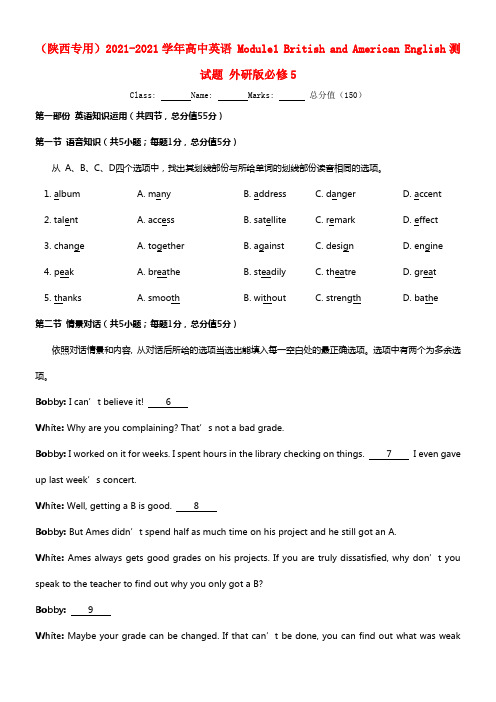
(陕西专用)2021-2021学年高中英语 Module1 British and American English测试题外研版必修5Class: Name: Marks: 总分值(150)第一部份英语知识运用(共四节,总分值55分)第一节语音知识(共5小题;每题1分,总分值5分)从A、B、C、D四个选项中,找出其划线部份与所给单词的划线部份读音相同的选项。
1. album A. many B. address C. danger D. accent2. talent A. access B. satellite C. remark D. effect3. change A. together B. against C. design D. engine4. peak A. breathe B. steadily C. theatre D. great5. thanks A. smooth B. without C. strength D. bathe第二节情景对话(共5小题;每题1分,总分值5分)依照对话情景和内容, 从对话后所给的选项当选出能填入每一空白处的最正确选项。
选项中有两个为多余选项。
Bobby:I can’t believe it! 6White:Why are you complaining? That’s not a bad grade.Bobby: I worked on it for weeks. I spent hours in the library checking on things. 7 I even gave up last week’s concert.White: Well, getting a B is good. 8Bobby:But Ames didn’t spend half as much time on his project and he still got an A.White:Ames always gets good grades on his projects. If you are truly dissatisfied, why don’t you speak to the teacher to find out why you only got a B?Bobby:9White:Maybe your grade can be changed. If that can’t be done, you can find out what was weakabout it and try to improve on those points in your next project.Bobby:10第三节语法和辞汇知识(共15小题;每题1分,总分值15分)11. It will make big difference to our program whether you are in favor of it or not.A. /; /B. a; theC. a; /D. /; the12. Every student is encouraged to their opinions in class, whether right or wrong.A. compareB. presentC. announceD. remark13. It’s generally agreed that mass production and mod ern technology have decreases in working hours.A. begun withB. led toC. given upD. put off14. You shouldn’t complain about too much housework. , it’s your choice to be a housewife.A. In factB. As a resultC. Above allD. After all15. Do you know the difficulty I had this to a foreigner with my poor English?A. explainingB. explainedC. to explainD. explain16. A true friend will make every to help you whenever you’re in difficulty.A. attemptB. strengthC. effortD. contribution17. She appeared to be listening to the teacher attentively, , in fact, her mind was hundreds ofmiles away.A. whenB. whichC. whileD. what18. — But your car my way.—Sorry, sir. I didn’t realize that.A. blocksB. is blockingC. blockedD. was blocking19. She has a very way of walking, so I can recognize her easily.A. scientificB. formalC. standardD. distinctive20. More and more people choose to shop in a supermarket as it offers a great of goods.A. varietyB. mixtureC. extensionD. combination21. I some knowledge of bridge card just by watching my classmates playing it.A. took upB. picked upC. put upD. brought up22. you’ve decided to make a trip to Africa, I wish you a good journey.A. AlthoughB. UnlessC. As long asD. Now that23. — You answer the question, Joe.— Sorry, sir. . Will you say it again?A. It’s up to youB. I’ll have a tryC. That’s settledD. I didn’t get it24. They have much in common, I think is the main reason why they become the best friends.A. whatB. thatC. itD. which25. Her health is picking up. So it’s hopefully that she will return to work next month.A. steadilyB. quietlyC. actuallyD. completely第四节完形填空(共20小题;每题1.5分,总分值30分)We often say kids are blessed with endless creation, and that is a fact.I remember reading a story about how a teacher 26 to inspire the students in her class. The story happened in a 27 class for students in a primary school. The teacher drew a lot of 28on the blackboard. Then the 29 was raised by the teacher that what came to 30 when they caught the first sight of the white sheep.The kids gave the teacher many answers. For example, some of them said the sheep 31 like white snow in winter. Others said they were like masses of marshmallow. It was a 32 that all the answers were denied (否定) by the teacher, for she was 33 someone could point out the sheep’s likeness to white clouds in the sky. 34 , all the kids failed to 35 the teacher’s goals.Judging from the 36 from the teacher that the students lacked 37 , we can certainly point out that the teacher wasn’t well 38 to teach. She did not 39 the variety(多样化) of the answers provided by the students. According to the students, they did not know why their teacher40 no to their answers.I think I must be a 41 and qualified (合格的) mother. Let me show you how I try to 42 my kids. My elder son is very fond of Harry Potter. I 43 much buying him several Harry Potter costumes (服装). Now he is a high school student, who is found to be good at 44 . He founded a club and now the membership is 45 rapidly. They are very confident to stand out in the competition with their own costumes.Of course, I am proud of my boy.26. A. refused B. wished C. failed D. managed27. A. drawing B. biology C. photography D. composition28. A. pictures B. sheep C. clouds D. snow29. A. voice B. hand C. question D. subject30. A. mind B. life C. eyes D. imagination31. A. fed B. felt C. looked D. ran32. A. fact B. pity C. story D. joke33. A. promising B. demanding C. waiting D. expecting34. A. Unfortunately B. Surprisingly C. Undoubtedly D. Clearly35. A. pass B. reach C. set D. find36. A. lessons B. blame C. hopes D. manners37. A. experience B. interest C. confidence D. creativity38. A. foolish B. polite C. able D. strict39. A. notice B. point C. expose D. catch40. A. chose B. added C. gave D. said41. A. loving B. imaginative C. responsible D. beautiful42. A. praise B. inspire C. train D. cure43. A. considered B. suggested C. spent D. enjoyed44. A. designing B. performingC. playingD. communicating45. A. absorbing B. spreading C. changing D. increasing第二部份阅读明白得(共两节,总分值40分)第一节(共15小题;每题2分,总分值30分)AOnce, a rabbit built a beautiful house, where he lived very happily. He built it so well that, when a great rainstorm arrived, his house stood still. However, the rainstorm often flooded nearly the whole forest, and the homes of many animals were destroyed.Soon, one after another, the homeless animals came to his door, asking if they could spend that winter with him in his home. He invited each visitor in, and gradually the house was full, and finally there was no room left. Though it was crowded, the rabbit was quite happy. He enjoyed sharing his house with others.In spring, all the animals returned to their own newly-built homes. One day the rabbit was playinghappily outside. He did not realize that a lynx (山猫) was watching him nearby. One of the animals who had spent the winter in the rabbit’s home saw this and warned him just in time. And he shouted to the rabbit to come into his home.The lynx destroyed that home, but the rabbit managed to escape and run to hide in the home of another friend. For a whole day, the lynx followed the rabbit from house to house, from cave to cave, but the rabbit always managed to save himself. He was helped all the time by the friends because they were all given help by him in the winter.The rabbit felt very happy, not only because he had escaped the dangerous lynx, but also because he had made so many friends in the forest.46. Why did those animals come to the rabbit’s house?A. Because they wanted to make friends with the rabbit.B. Because they had no house to spend the winter in.C. Because they were all attracted by the rabbit’s beautiful house.D. Because the rabbit’s house was safe from dangero us animals.47. Which of the following can be best used to describe the rabbit?A. Clever but proud.B. Polite and careful.C. Kind and friendly.D. Careless and unlucky.48. How did the rabbit escape from the lynx?A. The lynx was killed by those animals the rabbit had helped.B. The rabbit hid in an animal’s safe house for several days.C. The rabbit ran so fast that the lynx could not catch him.D. The animals the rabbit had helped helped him to escape from the lynx.49. The story mainly tells us .A. it is good to be helpfulB. a friend is a second selfC. a friend without faults will never be foundD. helping others is helping oneselfBDear Marc,From your last letter I can see you have some friends and that they also like you. But what you’re lacking is a social life. When your best friends move away at any age, they leave a big hole in your life and that’s hard for you. I think your classmates would probably be surprised that you haven’t be en hanging out with any of them just as you might be surprised why some of them have also been so lonely.Here are some of my ideas of changing your situation. If there are any new kids in your school, they’ll probably be excited to hang out with you or have you show them fun places in your town. Sometimes inviting someone who might become your friend to study for a test together or to go for pizza after a game is a good way to turn someone you know into a friend or to get to know someone better. Talking to different kinds of people is a way to meet different types of people. You might also try joining a new club, like doing some voluntary (志愿的) work in your community or for your school play.You’re already doing all the right things in your school and in your neighborhood. And people like you for what you do. In the first year, students have far less stress than they do in their final year when they are prepared for going to college. Therefore, you might think about getting some part-time work to fill your time. It could give you more practical experience and a chance to meet new people, too.Good luck!Amy50. What was probably talked about in Marc’s last letter?A. His problems.B. His future plan.C. His study.D. His health.51. Which of the following is NOT the author’s suggestion?A. Going out with new classmates.B. Exchanging gifts with classmates.C. Studying together with classmates.D. Eating something with classmates.52. Why did the author write this letter?A. To show Marc how to learn his lessons well.B. To help his classmates as much as possible.C. To advise Marc to find a part-time job.D. To tell Marc how to improve his social life.CI had traveled a long distance from India to America in order to join my mother, who had been here for three years and hoped that America would help my future.On the first day, with anxiety on the one hand and fear on the other, I opened the door of the classroom slowly. Everyone’s eyes were on me as I entered the room. Without paying attention to them, I went straight to the teacher and asked if this was the right class. In a soft voice, he answered, “Yes.” His voice comforted me a little. He gave me a sheet called Course Requirements, which I would never get in India because we didn’t have anything like that. Then he asked me to choose where I would sit. I chose the seat closest to the door instead of the corner where all of the boys were sitting. I didn’t actually want to pick a seat. In India we were given seats by teachers. I spent the rest of the class taking notes from the images produced by the projector (投影仪). In Indian schools, we didn’t use the technology we had. In America, the teachers ha d a fun way of making hard things soeasy that a three-year-old child could do them.At the end of the day, I was on my way to the school bus which we didn’t have in India either. I found my bus easily and sat down inside silently. I was thinking: today wa sn’t so bad.As time passed, I developed some friendships and started to love my school. I found out that the US citizens have many opportunities but not everyone is using them. And some of them cannot realize that people in other countries are struggling for these opportunities.53. The author went to America mainly to .A. visit her motherB. experience a different lifeC. go to schoolD. take a holiday54. How did the author feel on the first day at the American school?A. She felt anxious and afraid.B. She felt excited and worried.C. She felt happy and thankful.D. She felt comfortable but lonely.55. From the passage we can know that .A. it’s difficult for foreign students to follow the teachers in AmericaB. American schools are just the same as Indian schoolsC. Americans can make full use of their opportunities for successD. there are many differences between American schools and Indian schools56. Which of the following can be the best title for the passage?A. My struggle in AmericaB. Friendships in AmericaC. My first day at an American schoolD. American school lifeDThank you for buying an Evan-Moor e-book!Attention:In order to use this e-book you need to have Adobe Reader 8 or higher. To download Adobe Reader for free, you can visit .Using this e-book:This e-book can be used in a variety of ways to improve your classroom activities.You can:• Attract students by projecting this e-book onto an interactive whiteboard (交互式电子白板).• Save paper by printing out only the pages you need.• Find what you need by performing a keyword search and much more. For helpful teaching suggestions and creative advice on how you can use the features of this e-book to improve your teaching methods, you can visit .User agreements:After you buy these Evan-Moor electronic materials, you are given a single-user license which allows you to use the content of these electronic books for use within your classroom or home only. Sharing materials or making copies for other people or schools is prohibited. Evan-Moor Corporation keeps full intellectual property rights (知识产权) on all its products.If you would like to use these Evan-Moor e-books for more purposes that are not outlined in the single-user license (described above), please visit for an application form to use copyrighted materials.57. The passage is mainly designed for .A. the Evan-Moor e-book producersB. the Acrobat Reader usersC. the students who will use Evan-Moor e-booksD. the teachers who have bought Evan-Moor e-books58. Which one of the following statements can be learned from the passage?A. People can use Evan-Moor e-books only by Adobe Reader 8.B. E-books have no intellectual property rights.C. Evan-Moor e-books will save users some money.D. People can share their Evan-Moor e-books with their friends freely.59. On , you can .A. download e-books you wantB. get tips on how to use Evan-Moor e-booksC. perform a keyword searchD. learn your rights on Evan-Moor e-books60. The underlined word “prohibited” in the passage can best be replaced by .A. advisedB. allowedC. praisedD. prevented第二节(共5小题;每题2分,总分值10分)依照短文内容,从下框的A-F选项当选出能归纳每一段主题的最正确选项。
陕西省宁强县天津高级中学高中英语 Module1 British and American En
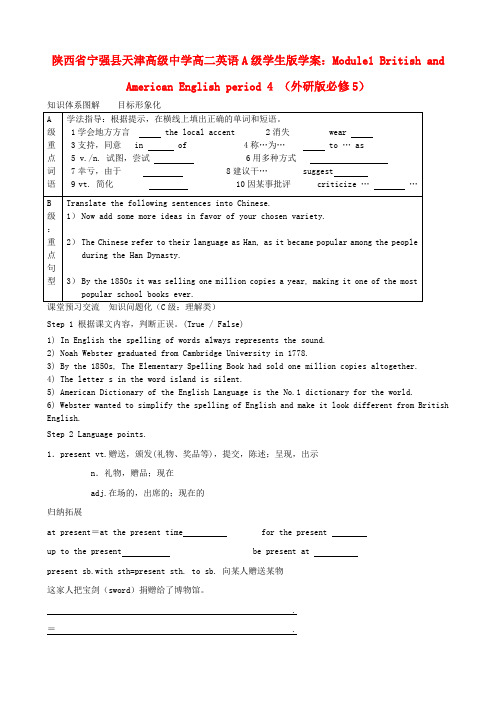
陕西省宁强县天津高级中学高二英语A级学生版学案:Module1 British and American English period 4 (外研版必修5)课堂预习交流知识问题化(C级:理解类)Step 1 根据课文内容,判断正误。
(True / False)1) In English the spelling of words always represents the sound.2) Noah Webster graduated from Cambridge University in 1778.3) By the 1850s, The Elementary Spelling Book had sold one million copies altogether.4) The letter s in the word island is silent.5) American Dictionary of the English Language is the No.1 dictionary for the world.6) Webster wanted to simplify the spelling of English and make it look different from British English.Step 2 Language points.1.present vt.赠送,颁发(礼物、奖品等),提交,陈述;呈现,出示n.礼物,赠品;现在adj.在场的,出席的;现在的归纳拓展at present=at the present time for the presentup to the present be present atpresent sb.with sth=present sth. to sb. 向某人赠送某物这家人把宝剑(sword)捐赠给了博物馆。
.=.present用作形容词,表示“在场的”时,通常作表语或后置定语;表示“现在的”时常用作前置定语。
陕西省宁强县天津高级中学高中英语《Module1 British and American En
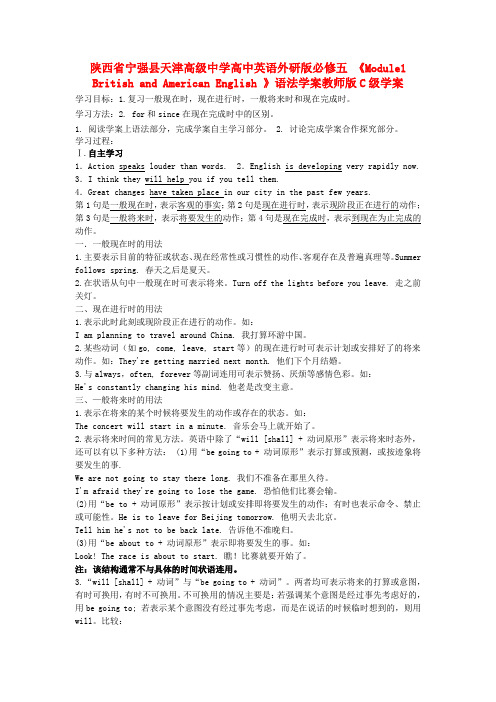
陕西省宁强县天津高级中学高中英语外研版必修五《Module1 British and American English 》语法学案教师版C级学案学习目标:1.复习一般现在时,现在进行时,一般将来时和现在完成时。
学习方法:2. for和since在现在完成时中的区别。
1. 阅读学案上语法部分,完成学案自主学习部分。
2. 讨论完成学案合作探究部分。
学习过程:Ⅰ.自主学习1.Action speaks louder than words. 2.English is developing very rapidly now. 3.I think they will help you if you tell them.4.Great changes have taken place in our city in the past few years.第1句是一般现在时,表示客观的事实;第2句是现在进行时,表示现阶段正在进行的动作;第3句是一般将来时,表示将要发生的动作;第4句是现在完成时,表示到现在为止完成的动作。
一.一般现在时的用法1.主要表示目前的特征或状态、现在经常性或习惯性的动作、客观存在及普遍真理等。
Summer follows spring. 春天之后是夏天。
2.在状语从句中一般现在时可表示将来。
Turn off the lights before you leave. 走之前关灯。
二、现在进行时的用法1.表示此时此刻或现阶段正在进行的动作。
如:I am planning to travel around China. 我打算环游中国。
2.某些动词(如go, come, leave, start等)的现在进行时可表示计划或安排好了的将来动作。
如:They're getting married next month. 他们下个月结婚。
3.与always,often, forever等副词连用可表示赞扬、厌烦等感情色彩。
陕西省宁强县天津高级中学高中英语 Module1 British and American En
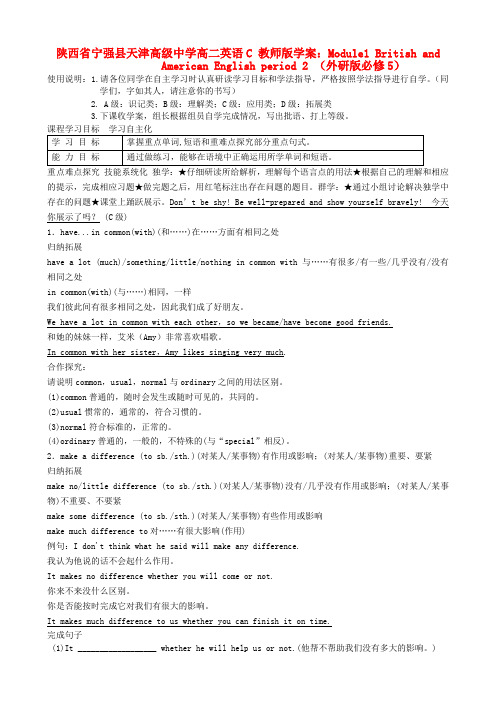
陕西省宁强县天津高级中学高二英语C 教师版学案:Module1 British andAmerican English period 2 (外研版必修5)使用说明:1.请各位同学在自主学习时认真研读学习目标和学法指导,严格按照学法指导进行自学。
(同学们,字如其人,请注意你的书写)2. A级:识记类;B级:理解类;C级:应用类;D级:拓展类3.下课收学案,组长根据组员自学完成情况,写出批语、打上等级。
重点难点探究技能系统化独学:★仔细研读所给解析,理解每个语言点的用法★根据自己的理解和相应的提示,完成相应习题★做完题之后,用红笔标注出存在问题的题目。
群学:★通过小组讨论解决独学中存在的问题★课堂上踊跃展示。
Don’t be shy! Be well-prepared and show yourself bravely! 今天你展示了吗? (C级)1.have...in common(with)(和……)在……方面有相同之处归纳拓展have a lot (much)/something/little/nothing in common with 与……有很多/有一些/几乎没有/没有相同之处in common(with)(与……)相同,一样我们彼此间有很多相同之处,因此我们成了好朋友。
We have a lot in common with each other,so we became/have become good friends.和她的妹妹一样,艾米(Amy)非常喜欢唱歌。
In common with her sister,Amy likes singing very much.合作探究:请说明common,usual,normal与ordinary之间的用法区别。
(1)common普通的,随时会发生或随时可见的,共同的。
(2)usual惯常的,通常的,符合习惯的。
(3)normal符合标准的,正常的。
高中英语 module1 British and American English教案 外研版必修5
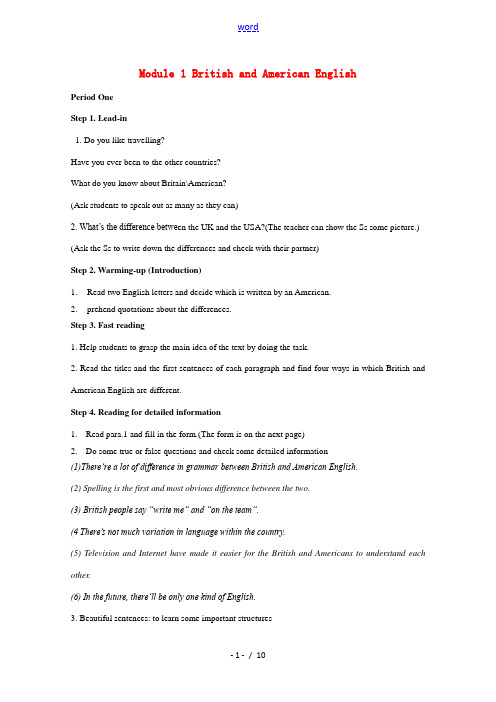
Module 1 British and American EnglishPeriod OneStep 1. Lead-in1. Do you like travelling?Have you ever been to the other countries?What do you know about Britain\American?(Ask students to speak out as many as they can)2. What’s the difference betwe en the UK and the USA?(The teacher can show the Ss some picture.) (Ask the Ss to write down the differences and check with their partner)Step 2. Warming-up (Introduction)1.Read two English letters and decide which is written by an American.2.prehend quotations about the differences.Step 3. Fast reading1. Help students to grasp the main idea of the text by doing the task.2. Read the titles and the first sentences of each paragraph and find four ways in which British and American English are different.Step 4. Reading for detailed information1.Read para.1 and fill in the form.(The form is on the next page)2.Do some true or false questions and check some detailed information(1)There’re a lot of difference in grammar between British and American English.(2) Spelling is the first and most obvious difference between the two.(3) British people say ”write me” and ”on the team”.(4 There’s not much variation in language within the country.(5) Television and Internet have made it easier for the British and Americans to understand each other.(6) In the future, there’ll be only one kind of English.3. Beautiful sentences: to learn some important structuresStep 5. Practise1.fill in the blanks with some key wordsThere’re four ways in which British and American Englis h ________ from each other. The first and most ________ way is in the vocabulary. In grammar there’re a few __________. The British say Have you got…? ______Americans prefer Do you have…? The British use prepositions ______ Americans sometimes ______them. The other two areas in which the two _________ are different are spelling and pronunciation. But for more than a century munications have developed _______.Thanks to satellite TV and the Internet, it has been possible to listen to many Englishmen at the ______ of a switch. So experts believe that the two are moving ______.3. Retell the text according to it.4. DiscussionWhich of the following do you think is the best language in the future? Why?British English, American English, world English, ChineseStep 6. VocabularyTask: Rewrite the sentences using the British words.1. Match the British and American words and phases in the box..2. Ask the students to read their answers out and pare with their partners.3. Rewrite the sentences using British words. .4. Summarize: and Practice:Step 7. Open workTry to find information about Chinese and prepare a report to introduce the following three aspects of Chinese.1.The writing system2.Varieties of Chinese3. Language todayPeriod TwoStep 1. Grammar 1Task 1: Find out the uses of the verbs. Rules of the tenses.Activity 1. Match the sentences with the correct meanings.Activity2. plete the sentences with the correct form of the verbs.Activity3. Tell the uses of the verbs. Rules of the tenses(1)plete the sentences in your own words.(2)Observe, pare and find out the rules.【】:I ____ ping-pang quite well, but I haven’t had time to play since the new year .A. will playB. have playedC. playedD. play【春招2000】:—You’re drinking too much.—Only at home. No one ________ me but you.A.is seeingB. had seenC. seesD. sa w2. Can you explain the following use of tenses.•present simple tense•present continuous tense•present perfect tense•future tenseStep 2. FunctionTask: Giving reasonsDirections:1. Underline the words which introduce reasons.2. Answer the questions.3. plete the sentences with because\since\as or now that.Step 3. Testplete the messages with the correct form of the verbs.Hi Mum,Hope you__________(be) well. I ________(have) a lovely time in New York. Tomorrow we___________ (go) to see the fireworks. It’s hard to understand the accent here, but it________(get) easier ,as I _________(be) here for 3 weeks. Next week we _________(fly) to Mexico where they ________(speak) no English at all, just Spanish. I __________(Spend) nearly all the money you gave me!Love , Xiao PingPractice : Make your own sentences creatively, using because, since, as or now that.Step 4. Everyday EnglishTask: Use the phrases freely.1. Remind the students of the expressions that we have learned.2. Ask the students to remember them .3. Speaking practice:Have a conversation using some of the phrases.Step 5. Homework•Have a good revision of today’s lesson and make sentences with the tenses and various words to express reasons. It’s better to do some related exercises.Period ThreeStep1. Warming up: Talk about the problems exchange students have.•understanding the language•getting on with people•food•different school subjects and timetable•local customs•climateStep 2. PresentationListen to the target language:•V ocabulary and Listening –2.Listening to the 1st part(5m)Listen and plete the passage. •Hello, and wele to today’s edition of In the air. As you know, every week on this programme we discuss an aspect of the way we _ _1____ now, and today’s topic is the language we ____2____-English. So that’s something which affects us all. The question is,what’s going to _ _3___ to the way we speak English in the future? Are we all going to speak like Americans? Or will British English continue to _ 4___? Later on we’re going to _ 5___ you to phone in and _ _6___ your views on the subject, but first we’re going to _ _7___ to two young people, one American, and one British, who have spent time on an educationa l exchange in the other’s country. We _ _8___ they will have some interesting ideas on the subject.•Play again to answer the quesrions. Make notes if necessary .( Activity 4)•Have the students pare the answer in pairs.•Play the tape a third time for a final check.•Check notes with the teacher.Step 3. Speaking and Writing•1. Review the content of the text by asking some questions.•In how many ways are American English and British English different?•Which is the first and most obvious way?•......2. The great debateWork in groups. Read the notes and decide which is the best variety of language in the future. Give your reasons.British English, American English, World English & Chinese3. WritingWrite a passage about your favourite choice and the reasons in the discussion above or write three more paragraghs about the Chinese language(activity 4 on P8).Step 4. HomeworkGet more information about the language through the Internet or other method to support your position.Period FourStep 1. Cultural corner1. Read the text quickly and match each paragragh with the correct main idea.2. Appreciate and analyze 2 or 3 long sentences.Step 2. Module File1. Review: Go over the vocabulary and grammar focus in the module file.2. Put“?” next to the things you a re not sure of .Then solve the problems in groups or raise your questions.3. Do some exercises to consolidate what we learned in this module.Step 3. HomeworkRecite the phrases and sentence patterns .Period 3: Grammar—Review of verb forms (1)Goals●To review Present simple, present continuous, present perfect and future reference; for and since with present perfectProcedures▇ Reviewing Present simple, present continuous, present perfectActive TensesTHE PASSIVE TENSES■Using the Present Perfect Tense: FOR or SINCE?We use Present Perfect tense to talk about action which started in the past and continues up to the present.ExamplesI have had this puter for about a year.How long have you been at this school?I haven't seen Julia since September.Tip! For other uses of the Present Perfect tense, see the Present Perfect Tense - When To Use.We use for with a period of time, for example: a few days, half an hour, two years. We use since with the time when the action started, for example: last year, June 8, I met you.Each of these present perfect sentences contains a time expression. Each time expression is alength of time (which requires FOR) or a starting time (which requires SINCE).1 Maya has been a professional ________ 1989.2 So far, it has rained ________ five hours.3 I haven't been snowboarding ________ last winter.4 Jo has been a student here ________ March.5 The beaver has been an emblem of Canada ________ many years.6 Cougars have almost disappeared from the Victoria area ________ humans settled here.7 Mary has kept a diary ________ she was ten years old.8 First Nations people in British Columbia have told stories about the eagle ________ hundreds of years.9 The Canadian two-dollar coin (or toonie) has been in circulation ________ 1996.10 They've been married ________ twenty-five years.11 I haven't phoned home______ Christmas.12 We've been here__________ nine o'clock.13 I have worked for International House__________ more than eight years.14 I haven't visited my home town_________ I left school.15 I haven't been to the cinema__________ ages.16 I have studied non-stop_________ 9.15.17 I have had a driving licence_________I was eighteen.18 She hasn't had a day off _________1999.19 Johan has been in England__________more than two weeks now.20 Peter has been my best friend_________ we were nine.■Closing down by deciding if you need for or since with these time expressions.---for/since last weekend---for/since ten seconds---for/since Christmas Eve---for/since a decade---for/since a couple of days---for/since my birthday---for/since a long time---for/since ten centuries---for/since the 70s---for/since I was a boy---for/since August---for/since the last month---for/since fifteen years---for/since ten seconds---for/since Christmas Eve---for/since a decade---for/since I finished school---for/since a couple of days---for/since my birthday---for/since a long time---for/since ten centuries---for/since the 70s---for/since I was a boy---for/since August---for/since the last month---for/since fifteen years---for/since the accident---for/since then---for/since we bought this house ---for/since last month---for/since I met you。
- 1、下载文档前请自行甄别文档内容的完整性,平台不提供额外的编辑、内容补充、找答案等附加服务。
- 2、"仅部分预览"的文档,不可在线预览部分如存在完整性等问题,可反馈申请退款(可完整预览的文档不适用该条件!)。
- 3、如文档侵犯您的权益,请联系客服反馈,我们会尽快为您处理(人工客服工作时间:9:00-18:30)。
陕西省宁强县天津高级中学高中英语《Module1 British and American English 》period 2 A级学案(学生版)外研版必修5使用说明:1.请各位同学在自主学习时认真研读学习目标和学法指导,严格按照学法指导进行自学。
(同学们,字如其人,请注意你的书写)2. A级:识记类;B级:理解类;C级:应用类;D级:拓展类3.下课收学案,组长根据组员自学完成情况,写出批语、打上等级。
课程学习目标学习自主化学习目标掌握重点单词,短语和重难点探究部分重点句式。
能力目标通过做练习,能够在语境中正确运用所学单词和短语。
重点难点探究技能系统化独学:★仔细研读所给解析,理解每个语言点的用法★根据自己的理解和相应的提示,完成相应习题★做完题之后,用红笔标注出存在问题的题目。
群学:★通过小组讨论解决独学中存在的问题★课堂上踊跃展示。
Don’t be shy! Be well-prepared and show yourself bravely! 今天你展示了吗? (C级)1.have...in common(with)(和……)在……方面有相同之处归纳拓展have a lot (much)/something/little/nothing in common with 与……有很多/有一些/几乎没有/没有相同之处in common(with)(与……)相同,一样我们彼此间有很多相同之处,因此我们成了好朋友。
____________________________________________________________________和她的妹妹一样,艾米(Amy)非常喜欢唱歌。
____________________________________________________________________合作探究:请说明common,usual,normal与ordinary之间的用法区别。
2.make a difference (to sb./sth.)(对某人/某事物)有作用或影响;(对某人/某事物)重要、要紧归纳拓展make no/little difference (to sb./sth.)(对某人/某事物)没有/几乎没有作用或影响;(对某人/某事物)不重要、不要紧make some difference (to sb./sth.)(对某人/某事物)有些作用或影响make much difference to对……有很大影响(作用)例句:I don't think what he said will make any difference.我认为他说的话不会起什么作用。
It makes no difference whether you will come or not.你来不来没什么区别。
你是否能按时完成它对我们有很大的影响。
It makes much difference to us whether you can finish it on time.完成句子(1)It __________________ whether he will help us or not.(他帮不帮助我们没有多大的影响。
)(2)If you want to __________________,you should work hard.(如果你想与别人不一样,你就应该努力工作。
)(3)Does his failure __________________?(他的失败对你有影响吗?)3.get around 四处走动;旅行;(新闻或消息)传开【典型例句】She gets around with the help of a stick.她拄着拐杖四处走动。
His work makes it possible for him to get around in different countries.他的工作使他能在不同的国家旅行。
他要走的消息很快传播开了。
News soon __________that he was leaving.【相关链接】get引导的其他常用的短语:get across____________ get down_____________________get along_____________ get down____________________get away______________ get over____________________4.confusing adj.令人困惑的;难懂的归纳拓展(1)confuse vt.________________ confused adj.__________________confusion n.____________________(2)confuse A with/and B 把A和B相混淆be confused by sth.被……搞糊涂了 get/become confused困惑,不知所措in confusion困惑地;困窘地例句:What he said was confusing,so I was confused at his words.他说的话很难懂,所以我对他说的话感到迷惑不解。
Don't confuse him with his brother.They are much alike.别把他与他的弟弟混淆了,他们非常相像。
He stood there in confusion.他困窘地站在那里。
用confuse的适当形式填空We can conclude his _______look suggests that he gets _______ by this _________question.pare v.比较;对比;与……类似n. 比较;对比This house does not compare with our previous one.这房子比不上我们以前的。
The lady has a diamond beyond compare.这位女士有一颗独一无二的钻石。
Compared with that book,this one is much better.跟那本书相比,这本好多了。
【知识小结】compare 作动词是表示“比较;对比”或“与……类似”,常用在com pare A with B 或 compare A and B的结构中;也可以用作名词。
【相关链接】comparison n.比较;对比comparative adj.比较的;相对的comparatively adv.相对地填空用compare的适当形式填空。
(1)It is difficult to make a _________ between this book and that one.(2)My problem seemed nothing _________ with other people’s.(3)_________ with the size of the whole ea rth,the biggest ocean does not seem big at all.pareB.When comparedparingD.When comparing(4)_________ with his bike,this one is more expensive.pared withparing withC.To compare withpare with 6.differ v.不同;相异differ with/from sb./on/about/over sth.关于某事与某人意见不同different adj.不一样的;有区别的difference n.不同;差别;差异同义句转换:British English and American English differ in many ways.=British English ______ _______American English in many ways.=British English ____ ________ _______American English in many ways.=There are between British English and American English in many ways. 英国英语和美国英语在很多方面有区别。
I’m sorry to differ with you on/about/over that.对不起,在那一点儿上我与你看法不同。
7.表示“做某事有困难”可以用下列几种结构:have difficulty (in) doing sth.have difficulty with sth.there is (some) difficulty (in) doing sth.例句:They have no difficulty (in) talking with each other in English.他们之间用英语交谈没有丝毫困难。
There is no difficulty for you in being a dmitted into a teachers’ college.对你来讲,被一所师范院校录取没什么困难。
You can hardly imagine what difficulty I had______Alice to give up the foolish idea.A.persuaded B.to persuadeC.persuade D.persuading8.lead to 导致,引起;通向lead sb.to+n.带领某人到某地lead sb.to do sth.导致/使某人做某事lead a...life过着……的生活His carelessness led to his failing the exam.他的粗心致使他考试不及格。
我们的英语老师用一种奇特的方法促使我们很活跃地学习英语。
Our English teacher has a strange way of________________________________________________________________9.This non-stop communication,the experts think ,has made it easier for Britishpeople and Americans to understand each other.专家们认为,这种不间断的交流使英国人和美国人更容易互相理解了.make it +adj. /n. + for sb to do sth:it作形式宾语,真正宾语是__________。
